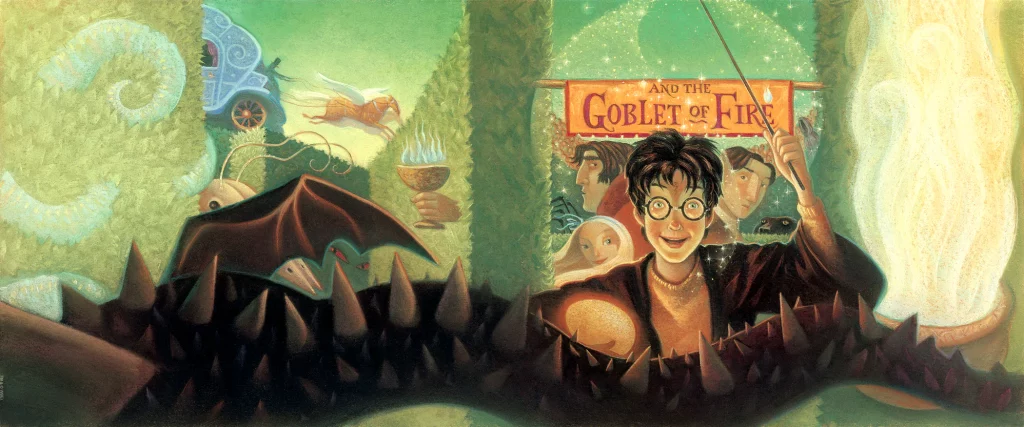Previously, we highlighted six iconic contracts in film as well as five books that are perfect for summer reading. This time, I wanted to explore five specific deals or agreements in fiction that can be 100% described as a bad deal.
But first, here are a few ground rules for the contracts on this list:
- Must be found in literature.
- Must be fiction. It can be inspired by a real-life situation, but the deal and consequences must be fictitious.
- Must be consequences. A bad deal that’s canceled before anything negative occurs won’t find its way on the list.
I’m also limiting myself to just one deal per book or book series. And before we begin, it goes without saying that there will be spoilers (#spoileralert).
That being said, shall we get started?
Honorable Mention: Rumpelstiltskin

The fun part about lists is that you always have the freedom to add a few honorable mentions 🙂
In this case, I’ve included the old German fairy tale Rumpelstiltskin, which was published in Grimm’s Fairy Tales. Interestingly, university researchers from Durham and Lisbon claim that the story is about 4,000 years old.
Like many fairy tales, it revolves around a deal made with a mysterious individual. The dealmaker enjoys some initial short-term benefits but is then faced with an undesirable long-term consequence. There are many variants, but this trope is commonly called Deal with the Devil.
Plot
In Rumpelstiltskin, a girl is locked in a tower and given the impossible task of spinning straw into gold or else she will be executed. When all hope is lost, an imp appears and spins the straw into gold in exchange for a necklace. The girl is given the same task, and the imp appears again, helping for a ring in return. But on the third day, the girl is assigned the job once more, and the imp appears. This time, however, the imp demands payment of her firstborn child. Naturally, faced with death, she agrees.
The girl goes on to become queen and gives birth to a child. Rumpelstiltskin appears, demanding payment. Uninterested in the queen’s pleas to keep the child, the imp relents and offers an exit clause where the queen must guess the imp’s name within three days.
Of course, the queen fails to guess the correct name the first two nights. But then, while on a walk, the queen happens upon the imp singing and dancing. Unseen, the queen watches as the imp reveals his name. The next day, the queen says the name, and Rumpelstiltskin runs away in anger.
Why is it bad?
For a fairy tale, this is a happily ever after. Not only did the queen keep her child, but she rose from the position of a miller’s daughter.
But from a contractual perspective, everything was terrible. The first two days may have been normal – payment made in exchange for a service – but the third day is where things go wrong. The girl’s short-sighted thinking caused her to approach the deal in bad faith, while the imp’s demand for the child shouldn’t have even been agreed to in the first place.
Plus, despite the deal having been made years prior, the imp gives an exit clause. While it’s okay to amend agreements or add exits, the way this was done (the queen was obviously going to try to exercise the option as soon as it was given) is something that no normal company would ever do.
One last issue: Rumpelstiltskin needs a lesson in information security. Sharing sensitive information in a public setting is a definite no-go. What do you think would happen if the person carrying the nuclear football started singing the access codes?
Pied Piper of Hamelin

There’s a good reason why the expression “Pay the piper” exists in English.
Dating back to the Middle Ages, the legend of the pied piper (named for his style of clothing, not for having a pie in his face) refers to an individual who solves Hamelin’s rat infestation. By playing his pipe, the piper lures the rats into the Weser where they all drown.
At that point, despite promising to pay 1,000 guilders (gold pieces), the mayor reneges on his promise, withholds the money, and even accuses the piper of bringing the rats and extorting the town. The piper leaves, vowing to take revenge.
He later returns one day while the adults are at church. Playing his pipe, he leads the town’s children out of the town and into a cave where they’re never seen again.
Why is it bad?
On the surface, the contract is pretty simple: Earn 1,000 guilders by getting rid of the rats.
Nevertheless, it’s this simplicity that creates tons of trouble. There was no mechanism for the piper to force the mayor to pay, nor were there protections afforded to the piper.
Nowadays, many exterminators or other service providers request a deposit before providing their service. Meanwhile, banks often ask for collateral before giving a loan. This protects the provider from a situation when the client refuses to pay for services rendered.
The piper could have even done what some freelancers or independent contractors do, which is request 50% upfront and 50% after. This would have guaranteed that the piper walked away with some amount of money instead of empty pockets. However, the piper trusted the mayor, only to be betrayed and falsely accused.
Merchant of Venice

Like the previous tale, Shakespeare’s The Merchant of Venice inspired a commonly used expression (“pound of flesh”) and an oft-recited quote (“Hath not a Jew eyes?”).
The plot itself centers on a Venetian merchant named Antonio who defaults on a large loan from a Jewish moneylender named Shylock. Technically a comedy, the play is best known for its dramatic court scene.
To provide a bit of context, Antonio agrees to become the guarantor of a loan for a friend. However, the loan comes from Shylock, who has an antagonistic relationship with Antonio due to the merchant’s antisemitism and tendency to lend money without interest, resulting in challenging business conditions for Shylock.
Shylock agrees to lend the money without charging interest, but on one condition: If Antonio fails to pay back the money, Shylock may take a pound of Antonio’s flesh. Seeing the interest-free loan as generous, Antonio signs the agreement without hesitation.
Why is it bad?
This wouldn’t be a very interesting tale if there weren’t some drama.
Naturally, Antonio cannot repay the loan as his ships sink at sea. Despite Antonio’s friend offering twice the loan’s original amount to forgive Antonio’s debt, Shylock refuses to compromise, demanding the pound of flesh as payment. Various pleas for mercy from other characters also go unheeded as Shylock takes Antonio to court.
In court, Shylock loses his case dramatically when it’s pointed out that the contract says a pound of flesh with no specification about blood. Thus, if a drop of blood is spilled, Shylock is in breach of contract (which is never a good thing).
But since Shylock already refused the payment from Antonio’s friend, he’s no longer entitled to the offer. Making matters worse, since Shylock is Jewish, and he attempted to take a Venetian’s life, he forfeits his property.
Long story short, Shylock should have taken the deal when it was on the table. By making his decision while emotionally compromised and angry, he effectively loses everything.
Nevertheless, Antonio shouldn’t have even signed the deal in the first place. I’m not sure what you think, but in my book (play?), any financial agreement that carries a risk of death just isn’t worth it.
The Monkey’s Paw

Countless variations of this short story exist, whether it’s episodes of The X-Files and Buffy the Vampire Slayer or films like Wonder Woman 1984 and Pet Semetary.
The most concise description of this plot is that it’s essentially a “wish gone wrong” or “wish with unintended consequences”. In the original tale, a husband and wife are given a cursed monkey paw that grants one’s wishes but with hellish consequences.
Why is it bad?
The couple’s initial wish is for £200.
And they do get £200, but it comes in the form of a goodwill payment after their son is killed at work. The second wish is for their son to come back to life, and although it’s never confirmed, it’s implied that what comes back isn’t the son (essentially like Pet Semetary).
Normally, three magic wishes are supposed to come free and without strings attached. In the case of the monkey’s paw, it’s clear that there’s a transactional cost. You get what you wish for, but you must lose something.
Usually, when engaging in transactions, people want to enjoy a net benefit. Though there are exceptions, it’s typically illogical to make a deal that costs more than you get. In the case of the monkey’s paw, it’s clear that what you lose is much much more than what you get.
That, consequently, is what makes this such a bad deal.
And from the perspective of the monkey paw, it gets destroyed. No happy ending.
Harry Potter & the Goblet of Fire

This is a rather unique entry on my list as it features a contract where the party involved wasn’t even involved in making the deal.
The fourth book in the series, Harry Potter & the Goblet of Fire, features the Triwizard Tournament, whose contestants are selected by school via the aforementioned goblet.
But to be chosen, the champions needed to be at least 17 (Harry wasn’t). As it turns out, someone used a powerful charm on the goblet to confuse it, then added Harry’s name to the goblet, ultimately leading to its selection of Harry as a school champion.
Why is it bad?
The biggest reason why this is a bad deal is because Harry was forced into a situation that he didn’t even sign or agree to. Instead, somebody entered him into a binding magical contract without him ever knowing or consenting. To some extent, it resembles a case of identity theft.
And due to certain legal review oversights (and flawed assumptions), no exit clauses capable of invalidating the contract were included. So despite being underage, Harry had no choice but to follow through.
Considering the fact that the Triwizard Tournament could have and had resulted in the death of competitors, this situation is no different from shanghaiing someone into the navy, army, or some foreign legion.
That Time I Got Reincarnated as a Slime (Mjurran)

So far, we’ve highlighted a mix of German and English literature. This time, we’re going to head in a different direction by bringing up a Japanese light novel series about… a person who gets reincarnated as a slime (in a fantasy-type world).
For once, this novel’s “bad deal” doesn’t involve the main character. Instead, the central character is a woman named Mjurran.
Long before the events of the novel, Mjurran was a witch living in a forest where she was quietly doing magical research. Near the end of her life, she felt regret for not having advanced as far as she wished.
During that moment of weakness, a demon lord paid her a visit and offered her immortality and youth in exchange for allegiance. Mjurran agreed, and while she was made young again, she lost all her will and freedom as a cursed seal was placed on her heart. She became a “marionette” that could not defy the demon lord. Her only path to freedom lay in defeating her new master, which was impossible for her.
Why is it bad?
This is a pretty open and shut case of “selling your soul to the devil”. However, in most of those cases, the person gets to live a free life, and only when it’s time for them to pass away do they lose their soul.
But in this case, Mjurran inadvertently sold herself into a life of servitude. Compounding the tragedy is that she couldn’t even focus on what she wanted (research), which was the entire reason for restoring her youth.
For most people, the complete loss of freedom greatly outweighs the ability to be young again, because why be young if you can’t live how you want?
This lose-lose situation makes this a horrible deal.
Wrapping Up
Literature is filled with tons of examples of good, bad, and ugly deals. There’s a decent chance if you go to a library, close your eyes, and toss a rock at the nearest bookshelf, it’ll hit a book with a bad deal at its center.
These five were just some that I’ve encountered in my own personal reading. Suffice to say, they’re just the tip of the iceberg.
Next time I touch on contracts and agreements in popular culture, I’ll most likely focus on some that you would find in tv series.